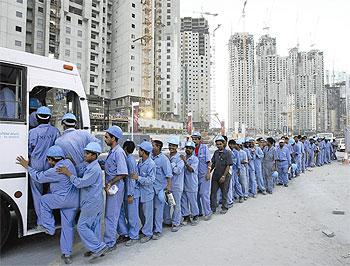Bahrain’s Labor Market Regulatory Authority (LMRA) has introduced a new regulation program that aims to give expatriates illegally residing and working in the country a way to obtain legal documentation to stay.
This new regulation program, called the Flexi Permit, will be a significant deviation from the current kefala system since it will give workers the option to sponsor themselves instead of work under a sponsoring employer. Those who are eligible for the program will receive a “Blue Card,” which acts as proof of their legal residency and work status in the country. It gives them permission to work for more than one employer as well as enter and exit Bahrain freely. It is renewable on a six-month basis.
The new system seeks to answer international calls for government reform. The Flexi Permit should decrease sponsor exploitation of employees, give workers more legal rights, and allow those enrolled to work more than one job under one employer. The economic benefits of the initiative also make it an attractive option. It promotes competition between sponsored and unsponsored workers in the job market and provides a strategy for mobilizing the sizable population of undocumented workers in the country.
However, Bahraini officials have failed to consider the adverse consequences of the program. First, the cost of the permit would likely make it inaccessible to many workers. Those who wish to participate are expected to pay a one-time fee of 449 BHD (1190 USD) for the two-year Flexi Permit plus a 30 BHD (80 USD) monthly fee. The one-time fee includes a mandatory 144 BHD healthcare fee, which does not cover the cost of individual healthcare visits (they must pay an extra 7 BHD per visit). These fees become very expensive for undocumented individuals who are often already struggling with high living costs.
The permit will also make it difficult to define what an employer’s responsibilities are in terms of providing for their employees. If employees carry the burden of paying the aforementioned fees, then the employer may not feel obligated to provide any additional benefits. Furthermore, employers who already have sponsored employees may choose to let them go in an attempt to skirt responsibility for their well-being. In the end, employer abuse of workers may actually be compounded, but in different ways than what is typically found under the kefala system.
The exclusive nature of permit eligibility is also a barrier to the success of the program. To be eligible, a person must have a passport, cannot have a criminal record, and must not possess “runaway” status. Often, expatriates are given “runaway” status after they have left a position in which the employer engaged in exploitative practices, including physical abuse. These workers are unable to take advantage of the Flexi Permit simply because they chose to escape an unsafe workplace. Further, those who make it past the eligibility portion of the program may have limited choice in types of work. Those who cannot pass the medical checks for the hospitality permit type must settle for the normal permit which restricts them from working in jobs within the hospitality industry (i.e. restaurants, hotels, etc.). The LMRA website names these as “non-specialized jobs,” restricting employment in professional fields (i.e. healthcare, engineering, etc.). This limits workers who seek to advance professionally.
The new Flexi Permit issued by the LMRA is the first of its kind in a region where the kefala system subjects millions of migrant workers to abusive work and living conditions. The ability for migrant workers to operate in the kingdom without a sponsor grants greater autonomy to the individual. However, problems still remain with the new system. Access to and eligibility for the Flexi Permit system remain barriers from which vulnerable populations of migrant workers will likely be excluded. The new system is a first step the Bahraini government has taken to improve the lives of the hundreds of thousands of migrant workers in the kingdom. Authorities should continue improving the system to improve accessibility.
Navneet Gidda, an Advocacy Intern at ADHRB





